Controls: Stick, rudder, throttle and the pilot's guts. Nothing else.
In fact, I lie: AG 8 locks the ground steering wheel.
The lack of trim, however, will force you to fly most of the time pushing the stick a little forward. This is characteristic of the Demoiselle: In the following pictures you may note it always flies "tail down", the pilot pushing forward.
Note: though engine stats say 400 hp, the throttle only goes up to 0.2, giving a maximum horsepower of 80. This is meant to save fuel, as the diminute size of the aircraft means the fuel tanks are very small, and unfortunately propeller engine fuel consumption does not scale with power in the game. It would be unfair and unrealistic for a small 80 hp engine to drink as much fuel as an engine that usually goes from anywhere around 250 to 1000 hp.
Before the introduction of the aircraft proper, I'd like to say that this is what I had in mind when I say I wanted to make a commemorative plane here. As I said then, unfortunately I wasn't able to do so at the time due to the looming semester finals. However, now that the finals are gone I finally had time to make this piece!
As such, consider this as my thanks for everyone's appreciation of my work so far! What else to better do this than a piece inspired by the very beginnings of aviation, and which pushed me to try out new techniques? This is my first aircraft with custom control surfaces, and it also features a more detailed "airfoil" shape for the wing. This was not only something I wanted to try - it was absolutely necessary to achieve the aesthetics of this plane!
I hope you will enjoy this plane as much as I enjoyed making it! With no further ado, let us go to the description proper.
This is the plane where it all started.
The very first aircraft produced by Socrux, as evidenced by its S.1 designation: The bird that saw the very founding of the company.
However, the aircraft it was based upon was even more important not only to Socrux, but to aviation as a whole.
The Demoiselle was a light aircraft designed by aviation pioneer Alberto Santos-Dumont in 1907. An extremely small and light aircraft, its structure was mainly made out of bamboo and its wings were covered in Japanese silk. Originally called No. 19 by Santos-Dumont, who named all his aircraft with a numbering sequence, its very diminute side earned it the nickname "Demoiselle" in France - meaning the diminutive for "Lady", but also used at the time to refer to dragonflies, which the aircraft resembled - and the name stuck.
The No. 19 had troubles with its underpowered engine and overly light construction, which meant only the short and light Alberto could fly it. Following it though, was a major redesign in the form of the No. 20 - the most "classic" Demoiselle, it used wing warping for roll control and recieved a reinforced fuselage with two extra bamboo bars running under the aircraft, as opposed to the No. 19's single tail boom.


The man and his machine. The compact size of the aircraft is apparent.
It was designed from the start to be easy to produce, and, as far as this can be said about a 1900's airplane, easy to fly. It holds the distinction of being, in a way, the world's first mass-produced aircraft, produced by several companies around the globe - Santos-Dumont was so enthusiastic about aviation, he released all plans and blueprints for the Demoiselle completely free-of-charge, allowing any company or person to produce it. It was the plane in which many early pilots, including future WWI aces, would first learn to fly, one notable example being French aviator Roland Garros.

Roland Garros at the controls of a Demoiselle.
Its design was highly influential in its era, setting the standard for following aircraft. It can be considered the predecessor of modern light aircraft, and helped spread and push aviation beyond its small circle of designers. It is certainly one of the most important aircraft designed in the early days of aviation.
Santos-Dumont continued to improve the Demoiselle, which would ultimately be the last aircraft he would design before falling ill and retiring to his home in Brazil until his death. However, due to the plans being free-of-charge, many designers and companies would ultimately design their own versions and unique variations, as well as design new aircraft heavily based upon the Demoiselle's frame.


Socrux was one such company. Determined to build their own aircraft, a small group of friends worked on setting up a company to pursue their endeavours. The Demoiselle was the natural starting point, and in 1912 the Companhia Aeronáutica Socruz (later rebranded as Socrux) was founded, offering their first design for sale: A singificantly modified, somewhat enlarged version of the Demoiselle.
Aptly but perhaps uncreatively named Super Demoiselle, the aircraft was strengthened and enlarged, allowing heavier and taller pilots to fly the aeroplane. A larger, more powerful engine was devided specifically for the new plane, with air cooling assisted by two thin-tube radiators places around the wings as in the original Demoiselle. Also as in the original aircraft, the tailplane is mounted on a universal joint, so the rudder and elevators move together as one piece. Roll control, however, is provided by rudimentary aleirons, instead of the wing warping used in the original Demoiselle.
The pilot is provided with only two rudimentary instruments: a velocity indicator and an altimeter, which is a big improvement over the Demoiselle's nothing. The main fuel tank, mounted on the main fuselage strut over the wings, is assisted in longer trips by a larger auxiliary tank placed behind the pilot, who sits under the wings in the forward section of the plane.
It is a docile aircraft to fly, though takeoff is tricky thanks to the landing gear arrangement. The pilot may have to push forward on the stick a bit to get the tail wheel off the ground first, and only then pitch up for takeoff.
The new, proprietary-designed four-cylinder engine delivering 80 horsepower allows the aircraft to reach a top speed of 145 km/h (90 mph), a considerable improvement over the original Demoiselles using two-cylinder engines: 120 km/h (75 mph) for the 40 hp Clement-Bayard engined versions and 90 km/h (60 mph) for the 30hp Darracq-engined versions.
Image Gallery:











Specifications
Spotlights
General Characteristics
- Created On Windows
- Wingspan 25.4ft (7.8m)
- Length 25.6ft (7.8m)
- Height 7.8ft (2.4m)
- Empty Weight 231lbs (105kg)
- Loaded Weight 407lbs (184kg)
Performance
- Horse Power/Weight Ratio 0.981
- Wing Loading 1.5lbs/ft2 (7.4kg/m2)
- Wing Area 267.8ft2 (24.9m2)
- Drag Points 1159
Parts
- Number of Parts 186
- Control Surfaces 2
- Performance Cost 817

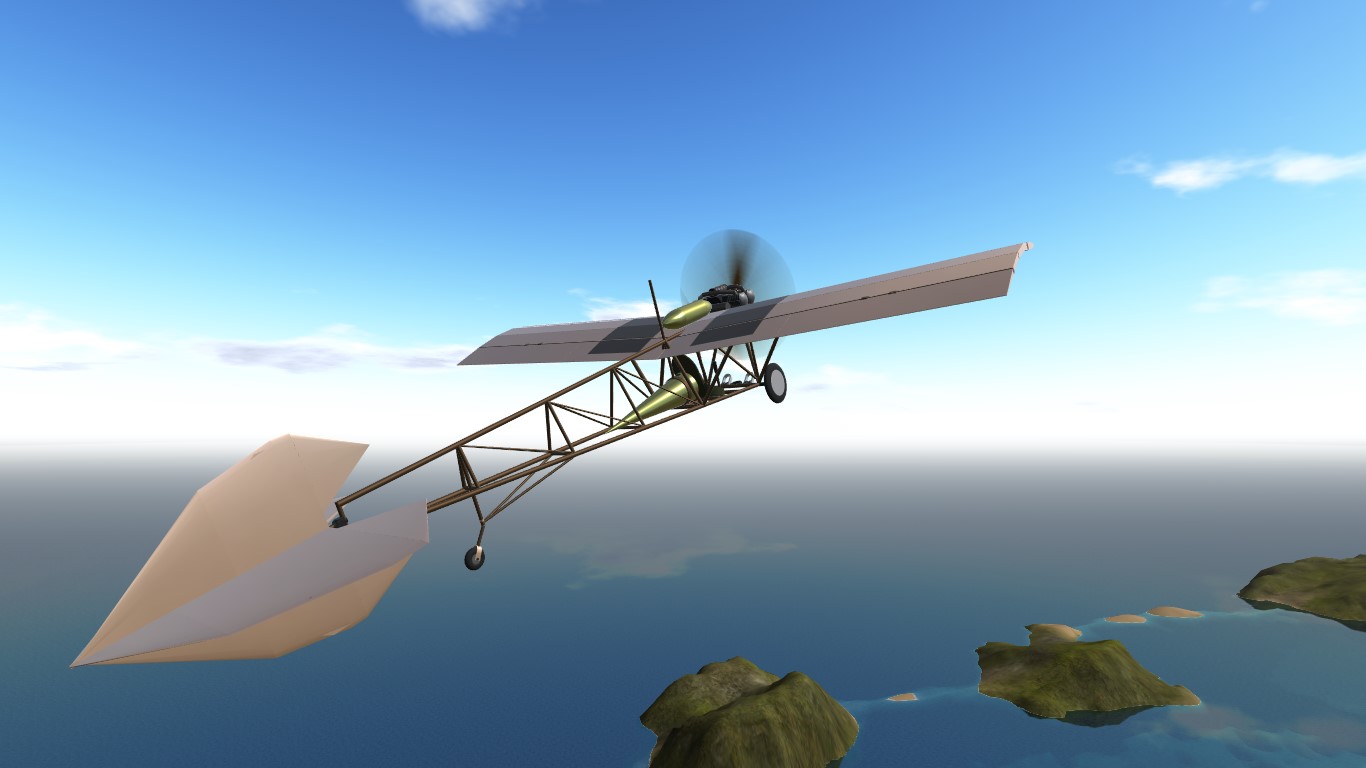
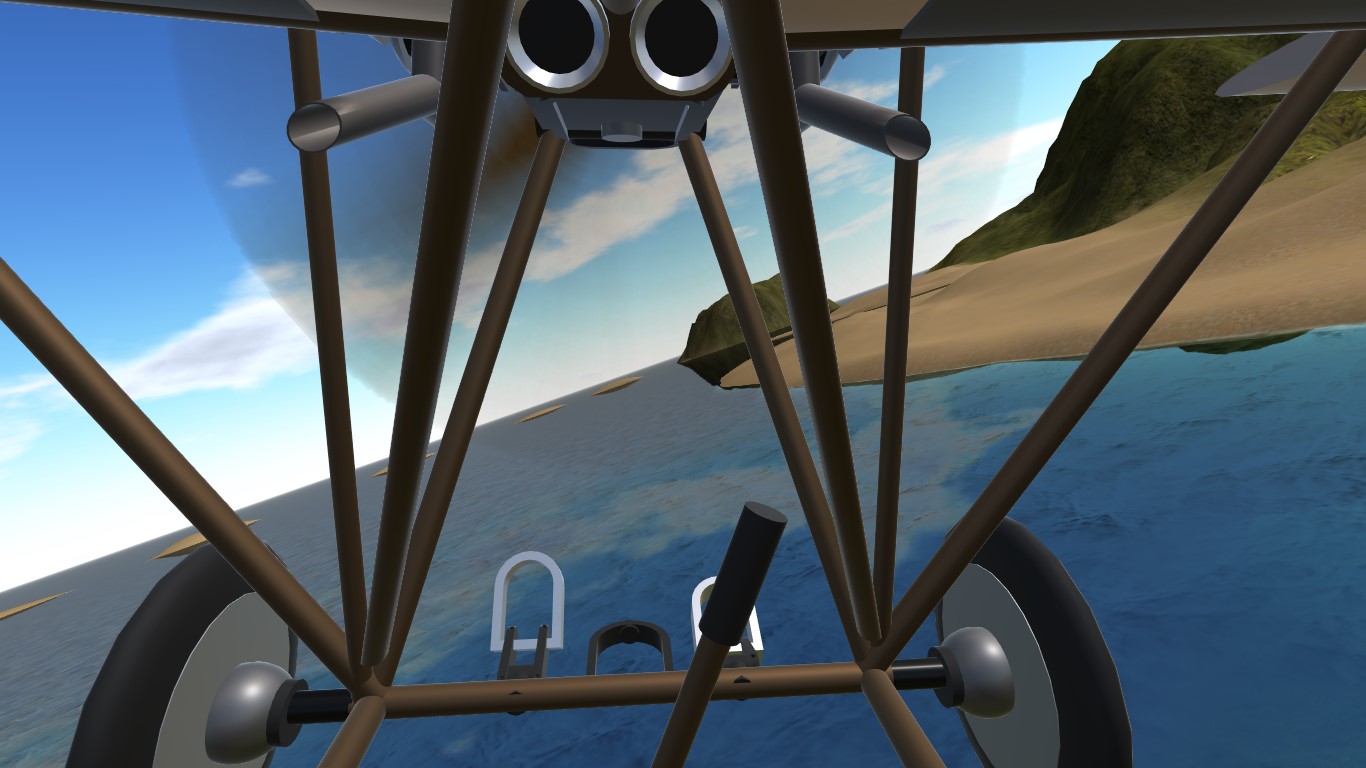
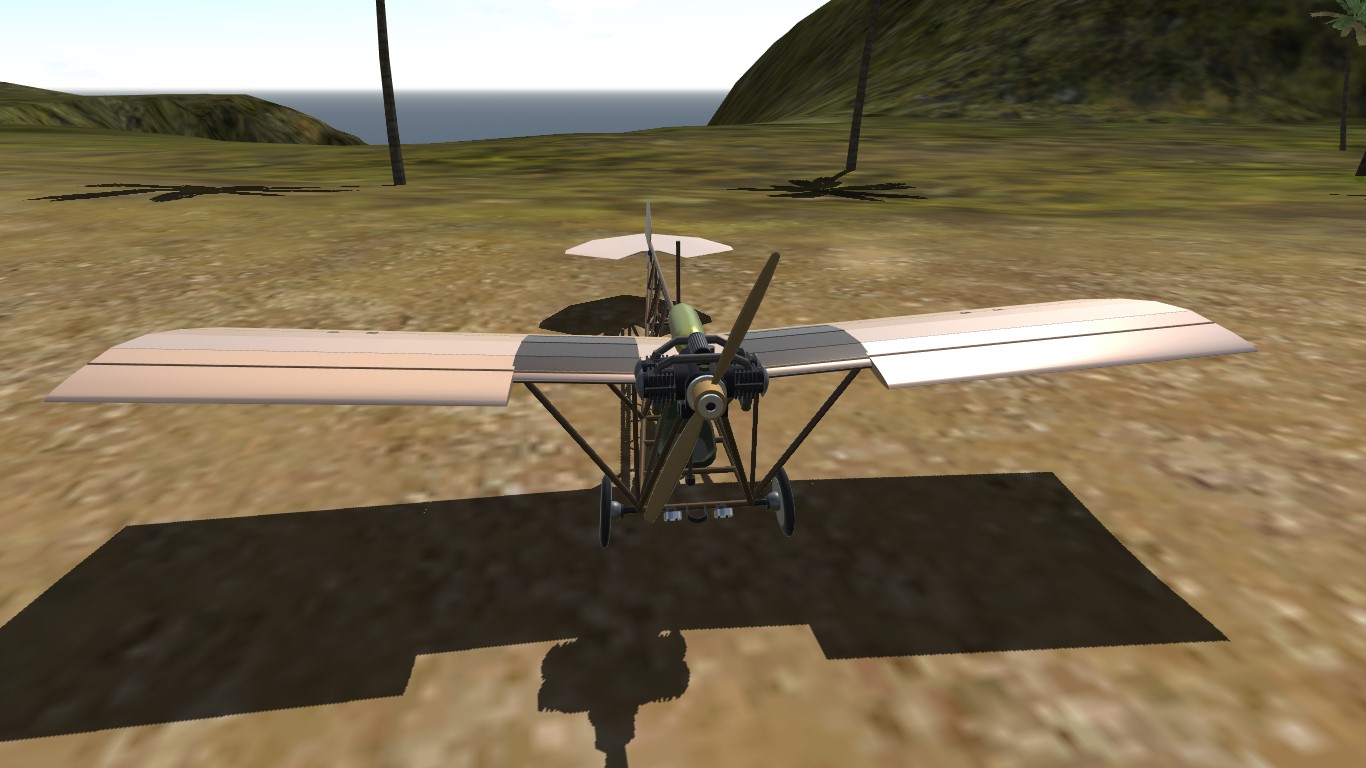
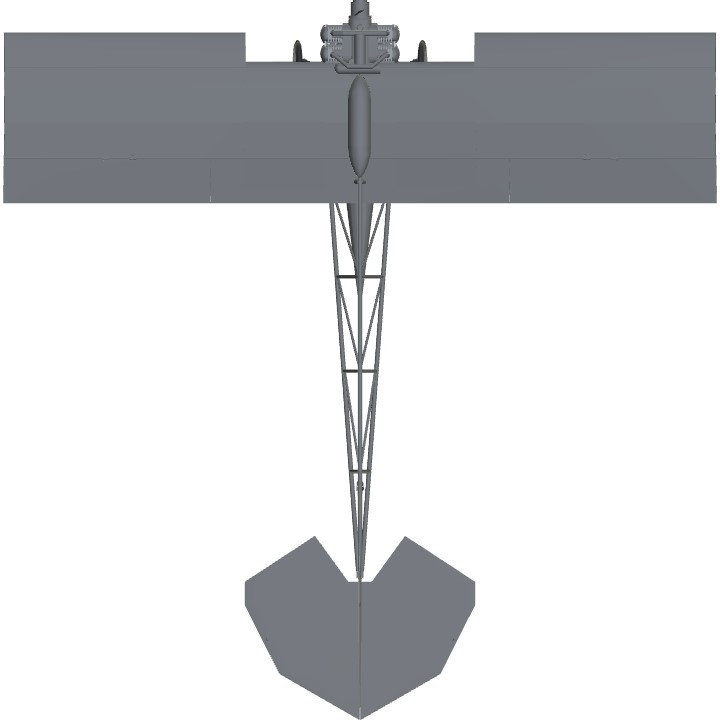
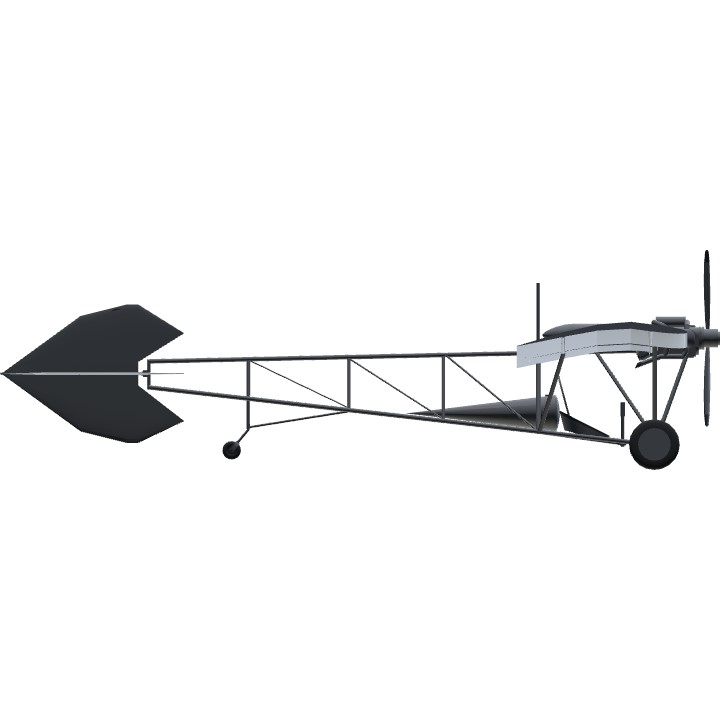
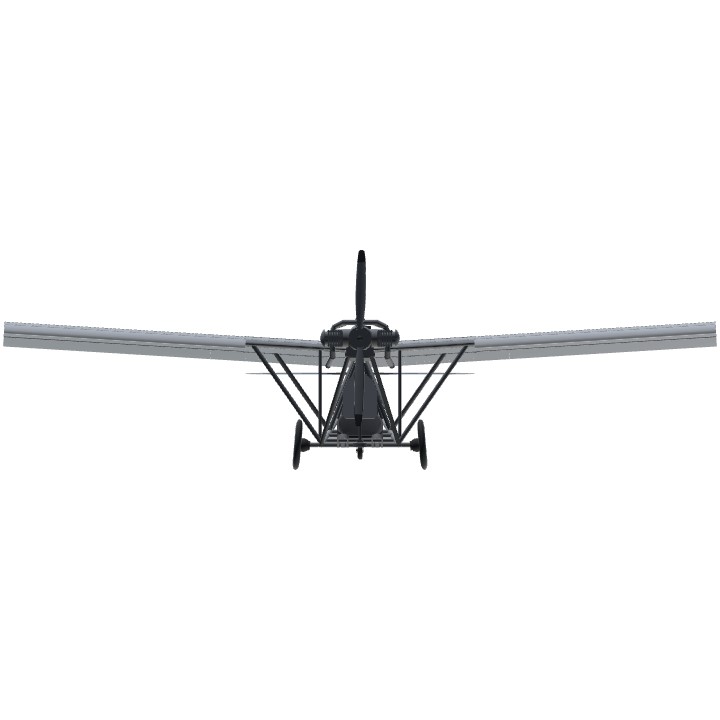
Got here from your post https://www.skywardfm.com/post/first-impressions-simpleplanes-2-demo
Nice job =)
Beautiful
Good job! :)
It looks like someone took the tail of a plane, stripped it, and put wings on it.
@Zanedavid Thankufully, that tiny fuel tank will run dry before you have to worry about that lmao
@Griffinthedragon It's a plane whose original design dates back to 1907, so... yeah, it pretty much is a deathtrap lol
@Mustang51 @edensk @Trainzo @ThePrototype @botto28 Thanks a lot, guys!
Imagine sitting in that position for more than an hour
Meus parabéns ficou show
Amazing job, wish early aircraft got more love. Hats off to you good sir.
A beautiful build but This thing looks like a death trap IRL
Just perfect job. And Nice présentation.
Wonderful! Quite simple but very elegant. This is a fantastic build
@FlyingHueman np
@MAHADI Thanks! Tried out a few new techniques, took me some time but I like how it turned out.
whoa! that's a pretty good work there!
@Mustang51
@JohnnyBoythePilot
@MAHADI
@Aeromen
@botto28
Just tagging some people who I believe might be interested in this. If I was wrong, let me know, and my apologies.
Woah